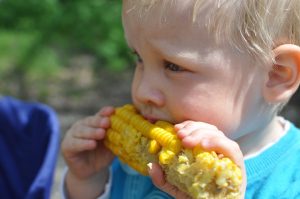
The month of
March is
National Colorectal Cancer Awareness Month as well as
National Nutrition Month.
Did you know?- Young onset Colorectal Cancer is on the rise
- 1 in 20 people will be diagnosed with Colorectal Cancer in their lifetime
- 10% of new Colorectal Cancer patients are younger than age 50
- Only 5-10% of Colorectal Cancers are hereditary, so that means the foods we eat and the lifestyle choices we make have a direct health impact on our and our children's risk of having Colorectal Cancer
There are risks that you CANNOT control and risks that you CAN control. Risks you CANNOT control:
- Family History and Genetics -Talk with your physician about genetic screening if there is a family history of Colorectal Cancer.
- Inflammatory Bowel Disease -If you have Crohn's Disease or Ulcerative Colitis, your risk of Colorectal Cancer is increased. Speak to your physician about when screening should begin.
- Age -As we age past 50, we are more likely to grow polyps that can grow into cancer tissue.
Risks you CAN control:
- Smoking -If you smoke, then get help quitting. If you don't smoke, then don't start.
- Physical Activity -Studies have shown that at least 150 minutes of moderate intensity or 75 minutes of vigorous intensity activity each week can decrease the risk of Colorectal Cancer.
- Nutrition -A balanced diet is of highest priority when it comes to reducing your and your child's risk of Colorectal Cancer.
Nutrition and Colorectal Cancer- Eating 50 grams/day (~ 1 hot dog or 3 chicken nuggets) of processed meat increases the lifetime risk of Colorectal Cancer. Processed meats undergo methods (curing, salts and preservatives, fermenting, smoking) to help preserve them so they have a longer shelf life. Processed meats include hot dogs, chicken nuggets, bacon, sausage, jerky, canned meat, and lunch meats.
- Eating 100 grams/day (~ ¼ pounder hamburger) of red meat increases the lifetime risk of Colorectal Cancer. Unprocessed meats do not undergo methods for preservation. Red meats that are unprocessed include beef, lamb and pork. Since there are no clear rules on eating meat and preventing Colorectal Cancer, keep the following in mind: -Avoid as many processed and red meats as possible -Buy meats that are nitrate free -Substitute poultry and fish for processed and red meats as much as possible
- For each 10 grams of Fiber eaten per day, there is a 10% risk reduction in Colorectal Cancer. Fiber adds bulk to the digestive system and shortens the amount of time that wastes and carcinogens travel through your colon. This decreases the chance for the cells of the colon to be affected. Also, bacteria in the colon break down fiber into substances that inhibit the growth of cancer cells in the colon. Work on increasing your Fiber intake by eating more whole foods such as fruits, vegetables, beans, and oats.
- Eat 1 clove of Garlic a day to help reduce your risk of Colorectal Cancer. The National Cancer Institute has recognized that the more raw and cooked garlic eaten, the lower the risk of Colorectal Cancer. Garlic contains anti-cancer preventing properties that halt the production of cancer forming substances.
The Nutrition we give ourselves and our children has an impact on the risk of developing Colorectal Cancer. Remember that March is
National Colorectal Cancer Awareness Month and
National Nutrition Month. Speak to your physician and your child's physician about making positive changes to your diet. Dress in
Blue Day is March 2, 2018. Dress in Blue to bring awareness to Colorectal Cancer. If you would like more information about gastrointestinal (GI) digestive disorders and nutrition in children, please contact Dr. Mona Dave's
Frisco Office or
Request Appointment Here.


 The month of March is National Colorectal Cancer Awareness Month as well as National Nutrition Month. Did you know?
The month of March is National Colorectal Cancer Awareness Month as well as National Nutrition Month. Did you know?